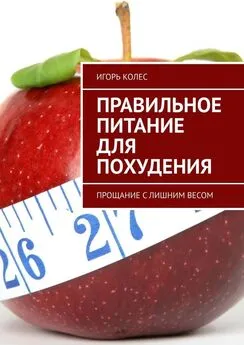Шарлотта Марки - Умным диеты не нужны. Последние научные открытия в области борьбы с лишним весом
- Название:Умным диеты не нужны. Последние научные открытия в области борьбы с лишним весом
- Автор:
- Жанр:
- Издательство:Array Литагент «Альпина»
- Год:2015
- Город:Москва
- ISBN:978-5-9614-3928-1
- Рейтинг:
- Избранное:Добавить в избранное
-
Отзывы:
-
Ваша оценка:
Шарлотта Марки - Умным диеты не нужны. Последние научные открытия в области борьбы с лишним весом краткое содержание
Умным диеты не нужны. Последние научные открытия в области борьбы с лишним весом - читать онлайн бесплатно ознакомительный отрывок
Интервал:
Закладка:
200
Barnes, B., & Stelter, B. (2013, June 18). Nickelodeon resists critics of foodads. The New York Times. Retrieved from http://www.nytimes.com/2013/06/19/business/media/nickelodeon-resists-critics-of-food-ads.html?nl=todaysheadlines&emc=edit_th_20130619&_r=1&
201
Strom, S. (2013, September 26). With tastes growing healthier, McDonald’s aims to adapt its menu. The New York Times. Retrieved from http://www.nytimes.com/2013/09/27/business/mcdonalds-moves-toward-a-healthier-menu.html?nl=todaysheadlines&emc=edit_th_20130927&_r=0
202
Strom, S. (2013, September 23). Burger King introducing a lower-fat Frenchfry. The New York Times. Retrieved from http://www.nytimes.com/2013/09/24/business/burger-king-introducing-a-lower-fat-french-fry.html?src=recpb&gwh=AEECC2D34F205D6F7A6222BF445516A9&gwt=pay
203
Nordqvist, C. (2012, June 24). High sugar cereals aggressively marketed at kids, despite pledge. Medical News Today. Retrieved from http://www.medicalnewstoday.com/articles/246996.php
204
Bittman, M. (2013, October 8). Why won’t McDonald’s really lead? The NewYork Times [blog]. Retrieved from http://opinionator.blogs.nytimes.com/2013/10/08/why-wont-mcdonalds-really-lead/?nl=todaysheadlines&emc=edit_th_20131009&_r=0
205
Iannotti, R. J., & Wang, J. (2013).Trends in physical activity, sedentary behavior, diet, and BMI among US adolescents, 2001–2009. Pediatrics, 132, 606–614.doi: 10.1542/peds.2013–1488
206
Northstone, K., Joinson, C., Emmett, P., Ness, A., & Paus, T. (2012). Are dietary patterns in childhood associated with IQ at 8 years of age? A population-based cohort study. Journal of Epidemiology and Community Health , 66, 624–628.DOI: 10.1136/jtech.2010.111955
207
Christakis, N. A., & Fowler, J. H. (2007).The spread of obesity in a large social network over 32 years. New England Journal of Medicine, 357, 370–379. doi:10.1056/NEJMsa066082
208
Markey, C. N., & Markey, P. M. (2014). Gender, sexual orientation, and romantic partner influence on body dissatisfaction: An examination of heterosexual and lesbian women and their partners. Journal of Social and Personal Relationships. Vol. 31 (2), 162–177. doi:10.1177/0265407513489472
209
Markey, C. N., & Markey, P. M. (2013). Weight disparities between female same-sex romantic partners and weight concerns: Examining partner comparison. Psychology of Women Quarterly, 37, 469–477. doi: 10.1177/0361684313484128
210
Markey, C. N., & Markey, P. M. (2011). Romantic partners, weight status, and weight concerns: An examination of the Actor-Partner Interdependence Model. Journal of Health Psychology, 16, 217–225. doi: 10.1177/1359105310375636
211
Parker-Pope, T. (2012, April 18). Are most people in denial about their weight? The New York Times [blog]. Retrieved from http://well.blogs.nytimes.com/2012/04/18/are-most-people-in-denial-about-their-weight/
212
Loureiro, M. L., & Nayga, R. M. (2006). Obesity, weight loss, and physician’s advice. Social Science and Medicine, 62, 2458–2468. doi: 10.1016/j.socscimed.2005.11.011
213
Bleich, S. N., Bennett, W. L., Gudzune, K. A., & Cooper, L. A. (2012). National survey of US primary care physicians’ perspectives about causes of obesity and solutions to improve care. BMJ Open, 2, e001871. doi:10.1136/bmjopen-2012-001871
214
Loureiro, M. L., & Nayga, R. M. (2006). Obesity, weight loss, and physician’s advice. Social Science and Medicine, 62, 2458–2468. doi: 10.1016/j.socscimed.2005.11.011
215
World Health Organization (WHO) (2010). Urbanization and Health. Bulletin of the World Health Organization, 88 (4), 245–246. Retrieved from http://www.who.int/bulletin/volumes/88/4/10-010410/en/
216
US Department of Health and Human Services (USDHHS). (2005, August). Childhood Obesity. Retrieved from http://aspe.hhs.gov/health/reports/child_obesity/
217
Pollack, A. (2013, June 18). A.M.A. Recognizes obesity as a disease. The NewYork Times. Retrieved from http://www.nytimes.com/2013/06/19/business/ama-recognizes-obesity-as-a-disease.html?nl=todaysheadlines&emc=edit_th_20130619
218
CDC. (2012, April 27). Defining obesity. Retrieved from http://www.cdc.gov/obesity/adult/defining.html
219
Olshansky, S. J., Passaro, D. J., Hershow, R. C., Layden, J., Carnes, B. A., Brody, J., Ludwig, D. S. (2012). A potential decline in life expectancy in the United States in the 21st century. New England Journal of Medicine, 352 (11), 1138–1145. doi: 10.1056/NEJMsr043743; Warner, J. (2010, April 9). Baby boomers may outlive their kids: Higher obesity rates set kids up for poor health. Retrieved from http://www.medicinenet.com/script/main/art.asp?articlekey=115204
220
Ogden, C. L., Carroll, M. D., Kit, B. K., & Flegal, K. M. (2012).Prevalence of obesity and trends in body mass index among US children and adolescents, 1999–2010. Journal of the American Medical Association , 307, 483–490. doi: 10.1001/jama.2012.40
221
Ibid.
222
Ogden, C. L., Carroll, M. D., Kit, B. K., & Flegal, K. M. (2014). Prevalence of childhood and adult obesity in the United States, 2011–2012. Journal of theAmerican Medical Association , 311, 806–814. doi:10.1001/jama.2014.732
223
Markey, C. N., Markey, P. M., & Schulz, J. (2012). Mothers’ own weight concerns predict early child feeding concerns. Journal of Reproductive and Infant Psychology, 30 (12), 160–167. doi: http://dx.doi.org/10.1080/02646838.2012.693152
224
Ogden et al. (2014).
225
Ervin, R. B., & Ogden, C. L. (2013). Trends in intake of energy and macronutrientsin children and adolescents from 1999–2000 through 2009–2010. NCHS Data Brief , 113, 1–8.
226
Ibid.
227
WHO.(2009). Global health risks, mortality and burden of disease attributable to selected major risks. Retrieved from http://www.who.int/healthinfo/global_burden_disease/GlobalHealthRisks_report_full.pdf
228
Organization for Economic Cooperation Development. (2012). Obesity Update. Retrieved from http://www.oecd.org/health/49716427.pdf
229
WHO (2009).
230
Kelland, K. (2012, February 21). Obesity rates in developed countries are rising: Report. The Huffington Post. Retrieved from http://www.huffingtonpost.com/2012/02/21/obesity-developedcountries_n_1290937.html
231
Ibid.
232
WHO (2009).
233
National Cancer Institute (2012). Obesity and cancer risk. Retrieved from http://www.cancer.gov/cancertopics/factsheet/Risk/obesity
234
National Institutes of Health (NIH). (2012, July 13). What are the healthrisks of overweight and obesity? Retrieved from http://www.nhlbi.nih.gov/health/health-topics/topics/obe/risks.html
235
American Heart Association (2014, February 27). Obesity Information. Retrieved from http://www.heart.org/HEARTORG/GettingHealthy/WeightManagement/Obesity/ObesityInformation_UCM_307908_Article.jsp
236
A codependent relationship: Diabetes and obesity. (n.d.). Retrieved from http://www.diabeticcareservices.com/diabetes-education/diabetes-and-obesity.
237
Carr, D., Friedman, M. A., & Jaffe, K. (2007). Understanding the relationship between obesity and positive and negative affect: The role of psychosocial mechanisms. Body Image, 4, 165–177.
238
Jackson, T. D., Grilo, C. M., & Masheb, R. M. (2000).Teasing history, onsetof obesity, current eating disorder psychopathology, body dissatisfaction, and psychological functioning in binge eating disorder. Obesity Research, 8, 451–458.doi: 10.1038/oby.2000.56
239
Carr, D., & Friedman, M. A. (2005). Is obesity stigmatizing? Body weight, perceived discrimination, and psychological well-being in the United States. Journalof Health and Social Behavior , 46, 244–259.
240
Jackson et al. (2000).
241
Carr & Friedman (2005).
242
Markey, C. N., & Markey, P. M. (2011). Romantic partners, weight status, and weight concerns: An examination of the Actor-Partner Interdependence Model. Journal of Health Psychology, 16, 217–225. doi: 10.1177/1359105310375636
243
Alexander, S. C., Coffman, C. J., Tlusky, J. A., Lyna, P., Dolor, R. J., James, I. E….. Ostbye, T. (2010). Physician communication techniques and weight loss inadults: Project chat. American Journal of Preventive Medicine , 39, 321–328.
244
NIH. (2012, July 13). What causes overweight and obesity? Health Informationfor the Public. Retrieved from http://www.nhlbi.nih.gov/health/health-topics/topics/obe/causes.html
245
Harris, J. L., Bargh, J. A., & Brownell, K. D. (2009). Priming effects of television food advertising on eating behavior. Health Psychology, 28, 404–413. doi:10.1037/a0014399; Lesser, L. I., Zimmerman, F. J., & Cohen, D. A. (2013). Outdoor advertising, obesity, and soda consumption: A cross-sectional study. BMCPublic Health, 13, 1–7. doi: 10.1186/1471-2458-13-20
246
CDC. (2010). Obesity and genetics. Retrieved from http://www.cdc.gov/features/obesity/
247
Bouchard-Mercier, A., Paradis, A., Rudkowska, I., Lemieux, S., Couture, P., & Vohl, M. (2013). Associations between dietary patterns and gene expression profiles of healthy men and women: A cross-sectional study. Nutritional Journal, 12, 1–13. doi: 10.1186/1475-2891-12-24
248
Armon, G., Melamed, S., Shirom, A., Shapira, I., & Berliner, S. (2013). Personality traits and body weight measures: Concurrent and across-time associations. European Journal of Personality, 27 (4), 398–408. doi: 10.1002/per. 1902
249
Kern, M. L., & Friedman, H.S. (2008). Do conscientious individuals live longer? A quanitative review. Health Psychology, 27, 505–512. doi: 10.1037/0278-6133.27.5.505
250
Tucker, J., Friedman, H. S., Tomlinson-Keasey, C., Schwartz, J. E., Wingard, D. L., & Criqui, M. H. (1995). Childhood psychosocial predictors of adulthood smoking, alcohol consumption, and physical activity. Journal of Applied SocialPsychology, 25, 1884–1899. doi: 10.1111/j.1559–1816.1995.tb01822.x
251
Moss, M. (2013, February 20). The extraordinary science of addictive junk food. The New York Times. Retrieved from http://www.nytimes.com/2013/02/24/magazine/the-extraordinary-science-of-junk-food.html?ref=magazine&pagewanted=all&_r=0
Читать дальшеИнтервал:
Закладка:










